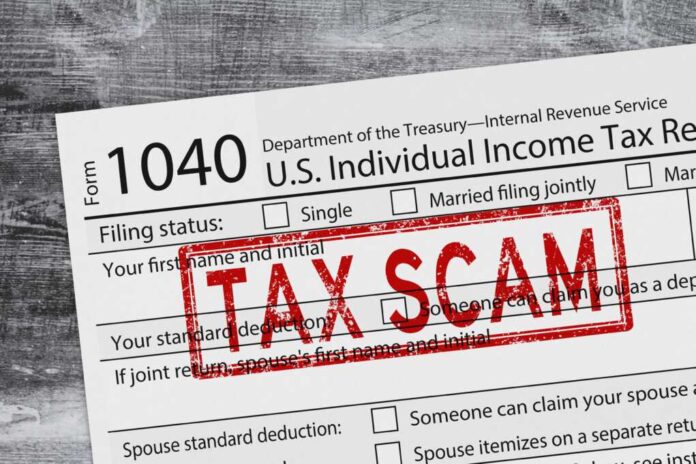
The IRS staffing reduction has created a perfect storm for sophisticated scammers using AI to target your tax refund and personal data.
At a Glance
- Scammers are exploiting IRS workforce cuts with increasingly sophisticated methods, including AI-generated phishing messages that appear legitimate
- Nearly 7.8 million reports of suspicious tax-related activities were filed in 2022, showing the scale of the problem
- The IRS never initiates contact through email, text or social media to request personal or financial information
- Filing taxes early, obtaining an IRS Identity Protection PIN, and using consistent tax preparation methods are your best defenses
- Freezing your credit reports is recommended to prevent fraudsters from opening accounts in your name using stolen information
The Growing Threat of Tax Season Scams
Tax season brings a predictable surge in scam attempts targeting both individuals and businesses. With recent workforce reductions at the IRS potentially slowing responses to fraud reports, scammers are seizing the opportunity to deploy increasingly sophisticated tactics. The combination of widespread data breaches and the emergence of generative AI has created a dangerous environment where phishing attempts and impersonation scams look more legitimate than ever before. Criminals are specifically targeting clean energy tax credits, Employee Retention Credits, and Fuel Tax Credits, areas where taxpayers might be less familiar with legitimate requirements.
Seniors remain particularly vulnerable to these attacks, with scammers often seeking to extract personal or financial information through manipulative tactics. The IRS reported nearly 7.8 million suspicious activity reports in 2022 alone, highlighting the scale of this problem. With over 90% of tax returns now filed online, the digital security implications have never been more significant. Understanding how these scams operate is your first line of defense in protecting your financial information and identity.
#TaxPros: Check out these #IRS tips on what to do in the event of a security breach — including how to notify your local Stakeholder Liaison and how to recover from the incident. https://t.co/aSHk1nTsU1
— IRStaxsecurity (@IRStaxsecurity) March 15, 2025
Common Tax Scam Tactics to Watch For
IRS impersonation remains one of the most prevalent tax scams. Fraudsters contact potential victims claiming to be IRS representatives, using pressure tactics like threats of arrest, deportation, or license revocation if immediate payment isn’t made. These criminals often demand payment through specific methods like gift cards or wire transfers – payment methods the real IRS never uses. The goal is to create panic and force hasty decisions before victims can verify the legitimacy of the communication.
“Uncertainty is probably one of the biggest motivating emotions that social engineers take advantage of” – Dave Chronister
Phishing schemes have evolved beyond simple email requests. Today’s scammers create convincing replicas of IRS websites and communications, complete with official-looking logos and language. They may offer fake tax refunds, claim you’re eligible for special credits, or warn about discrepancies in your tax filing. Fraudulent tax preparers represent another threat vector, potentially falsifying information on returns or diverting refunds to their own accounts. These dishonest preparers often promise unrealistically large refunds to attract victims, then disappear after filing fraudulent returns.
Cybercriminals are targeting #TaxPros through phishing scams, including posing as potential clients, to steal valuable data for tax-related identity theft. Stay ahead of incidents this filing season with the latest #IRS tips: https://t.co/Il93A8eR8I
— IRS Tax Pros (@IRStaxpros) March 19, 2025
How to Protect Yourself During Tax Season
Your best defense against tax scams starts with filing early – this prevents criminals from filing fraudulent returns using your information. Secure an Identity Protection PIN directly from the IRS, which adds an additional authentication layer that prevents anyone from filing a tax return in your name without the PIN. Consistency in tax preparation methods also matters significantly, as switching between different preparation services or methods can create vulnerabilities scammers might exploit.
“If you’ve always been using TurboTax, use TurboTax. If you always use an accountant, use your accountant” – Dave Chronister
Remember that the legitimate IRS will never initiate contact through email, text messages, or social media to request personal or financial information. They typically make first contact through regular mail delivered by the U.S. Postal Service. Be extremely wary of any communication demanding immediate payment, especially through unconventional methods like gift cards, prepaid debit cards, or wire transfers. The real IRS offers multiple payment options and an appeals process. Freezing your credit reports with all three major credit bureaus is also recommended, as this prevents criminals from opening new accounts using your stolen information.
Responding If You’ve Been Targeted
If you believe you’ve been targeted by a tax scam, report it immediately to the Treasury Inspector General for Tax Administration at TIGTA.gov. For phishing attempts, forward suspicious emails to [email protected] and report text scams to [email protected]. Identity theft victims should file Form 14039 (Identity Theft Affidavit) with the IRS and create an account at IdentityTheft.gov to develop a recovery plan. The financial toll of falling victim to these scams extends beyond the immediate theft – it can take months or even years to resolve the resulting tax issues and credit problems.
The surge in tax scams is a direct result of the government’s fiscal irresponsibility and massive spending programs that require increasingly complex tax codes to fund. The resulting confusion creates perfect conditions for scammers to exploit honest Americans just trying to comply with their tax obligations. Until we see meaningful tax simplification, vigilance remains our best protection against those who would exploit an unnecessarily complex system for criminal gain.
Sources:
https://www.irs.gov/help/tax-scams/recognize-tax-scams-and-fraud
https://www.cnbc.com/2023/02/02/how-to-protect-yourself-from-tax-fraud-and-scams.html
https://www.wcu.com/your-life/workers-blog/blog-detail/tax-season-scams–tips-to-protect-yourself
https://www.independent.co.uk/news/irs-new-york-promises-experts-equifax-b2720664.html






















